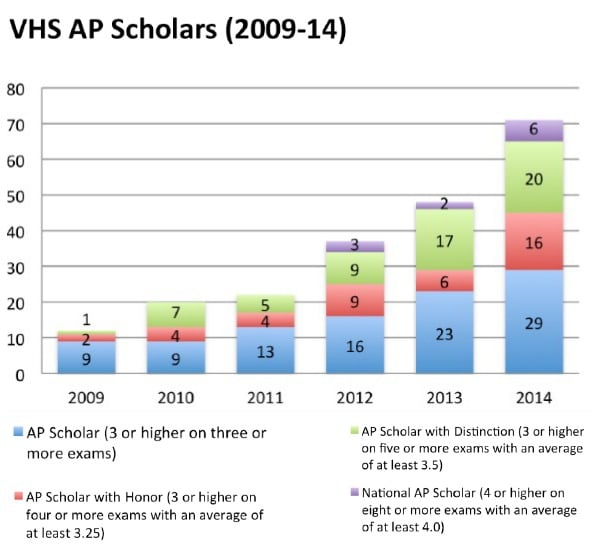 This week, Verona High School students who took Advanced Placement classes in the 2014-2015 school year will hear how they did on the tests that capped those classes. They worked hard in class all year and studied hard at home. But there has been one other factor in the upward trajectory of AP scores here, a factor that has largely gone unnoticed: VHS teachers who volunteer their time–many, many hours of their time–to help students review for the critical exams.
This week, Verona High School students who took Advanced Placement classes in the 2014-2015 school year will hear how they did on the tests that capped those classes. They worked hard in class all year and studied hard at home. But there has been one other factor in the upward trajectory of AP scores here, a factor that has largely gone unnoticed: VHS teachers who volunteer their time–many, many hours of their time–to help students review for the critical exams.
“Verona students have a grit to them that is unmatched by many of their contemporaries,” says Christopher Tamburro, who teaches AP U.S. Government and Politics. “Our teachers are going to do whatever we can to support this. We understand that we are working in a great town with highly engaged students. These sessions were not required, and the students still committed to participating despite the normal school work, employment, sports and activities.”
In 2011, Verona’s public schools began a push to enroll more students AP classes, a program created by the College Board to bring college-level classes into high schools. Enrollment in AP classes is looked at favorably by many college admissions counselors, who view them as a sign of “academic rigor” in coursework. What’s more, students who do well on the tests can often place out of entry-level classes in college, which can more than offset the $91 fee for each AP test taken. VHS ’13 graduate Ben Jung had so many AP credits that he was able to skip a full year at Canada’s McGill University. (You get get learn about the growth of VHS’ AP program by watching this presentation by Director of Instruction Charlie Miller last October.)
But there’s a lot of material to cover in many AP classes, sometimes much more than the Verona school calendar can accommodate, even without the PARCC testing that scrambled the high school’s schedule this spring. “In an ordinary school year, we might only have a little more than 100 hours of instructional time with the students before the AP exams begin in May,” says Rich Wertz, who teaches AP Calculus and AP Computer Science. “Each year we encounter disruptions to the schedule which eat away at that block of time–snow days, PARCC testing, field trips, athletic events, fire and lockdown drills, assemblies and the like. Extra sessions help reclaim some of that valuable instruction time lost to unplanned and planned disruptions to the school schedule.”
Wertz managed to grab more time with his students by scheduling two 90-minute sessions per week after school during the four weeks ahead of the exam. “The two sessions held each week were duplicate so that each student needed only to attend one of them,” he said, not noting of course that he needed to be at both. VHS leads the state in AP comp sci participation, by the way.
Sometimes, the work the teachers do is much more than just review. AP Chemistry, taught by Dr. Janan Wehbeh, meets once a week after school starting the first week of school just to get everything for the class taught. “The AP Chemistry class meets thirty to forty hours less than the recommended time and there is no way I can finish the curriculum during the allotted class time,” says Wehbeh.
She devotes the extra hour after school to problem solving practice. “We concentrate on solving multiple choice problems because the students have to solve these without a calculator and they are not used to it,” Wehbeh says. “Not everyone is able to come to every session because of extra curricular activities, sports, doctor appointments and the like, but I realize that so I do not teach anything new during this hour, it is just practice time.”

This year, the test followed closely on spring break, which put additional pressure on students and teachers. “Students didn’t want to lose any time”, says Eugenie Mordkovich, met with her AP French class during the vacation week. “They know that if you don’t use the language even for a week you ‘lose it’. Plus it gave me a chance to answer any questions that students had but we didn’t have enough time to go over them in class. To study for the language exam alone is tough, I think the meeting helped some of the students to calm down before the big day.”
For Tamburro’s AP U.S. Government and Politics students, getting ready meant more than 15 hours of review over spring break. They met in school, but also at the home of one of Tamburro’s students on a day that the school buildings were closed. Almost all students attended one of the sessions, and most came for at least three.
Tamburro had his students take a “diagnostic exam” to see which aspects of the class they were strong in and which needed more review. They drilled down again into the class’ key themes, which were most likely to be the topics of the test’s free response questions.
It wasn’t all work all the time, Tamburro admits. “In the process of studying, we shared pizza,” he says. “Thank you to Anthony Franco’s for giving me a volume discount a few times.” Taylor Lavery, one of his students, brought freshly baked study treats. “We played games including trivia and used a giant inflatable globe to run after when someone asked a challenge question and an individual knew the answer,” Tamburro added. “This kept our blood flowing.”
Robert Maher, who teaches AP European History and AP U.S. History II, has been doing extra review sessions for 10 years. “I want to give my students the broadest historical picture possible and then allow their own intelligence and initiative dictate how they will do on the AP test,” he says. “I portray the test as a challenge which is to be surmounted and it will be the first of many they encounter in life. The students respond positively to that message and many work hard to prepare themselves for the big event.”

